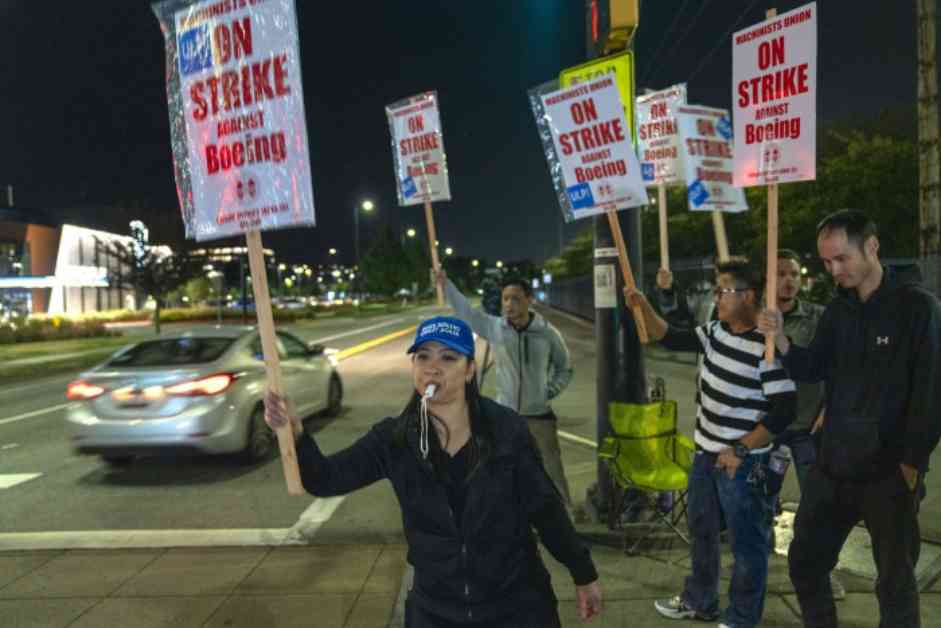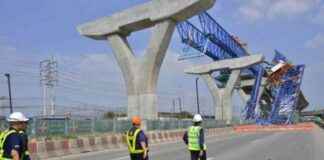Boeing Workers Go on Strike for First Time in 13 Years
In a historic move, 30,000 factory workers at Boeing’s commercial jet factory in Renton, Washington, have gone on strike, disrupting the production of the 737 Max. This marks the first strike by Boeing workers in 13 years, with the last one occurring in 2008. The strike comes after workers overwhelmingly rejected a contract deal proposed by the company, leading to a halt in production and a significant drop in Boeing’s shares.
The Strike and Its Impact
The strike was initiated after the International Association of Machinists and Aerospace Workers (IAM) members voted against the proposed contract, with 94.6% rejecting it and 96% in favor of a strike. The workers, who play a crucial role in producing Boeing’s best-selling 737 Max and other jets, are demanding better pay and working conditions for their labor.
The rejection of the contract deal and the subsequent strike have had immediate repercussions on Boeing’s operations and financial standing. The company’s shares fell over 2% following the news of the strike, adding to the struggles Boeing has faced in recent years. The ongoing crises, including the incident where a door panel blew off a 737 Max jet mid-air in January, have put Boeing under intense scrutiny from regulators and customers.
The Leadership Change
In response to the mounting challenges, Boeing appointed a new CEO, Kelly Ortberg, just weeks before the strike. Ortberg’s arrival was aimed at restoring faith in the company and navigating it through the turbulent times. However, the rejection of the contract deal by the workers and the subsequent strike have further complicated Boeing’s efforts to regain stability and trust.
The company’s stock has taken a hit this year, losing nearly 38% of its value and shedding $58 billion in market capitalization. With the added pressure from the strike, Boeing is facing a critical juncture in its operations and financial health.
Negotiations and Future Prospects
Despite the setback of the strike, both Boeing and the IAM are open to returning to the negotiating table to find a resolution. The company has indicated its willingness to improve the terms of the contract deal in order to reach an agreement with the striking workers. The IAM, on the other hand, remains steadfast in its demands for better compensation and benefits for its members.
The strike has also raised concerns among industry analysts and experts about the potential impact on Boeing’s supply chain and the broader aerospace sector. Airlines that rely on Boeing jets for their operations could face disruptions, while suppliers and manufacturers involved in the production of Boeing aircraft may also feel the effects of the strike.
The Way Forward
As the strike continues, both Boeing and the IAM must find common ground to address the issues at hand and reach a mutually beneficial agreement. The involvement of the Biden administration in the negotiations underscores the importance of resolving the strike in a timely and fair manner.
The outcome of the strike will not only impact Boeing and its workers but also have ripple effects across the aerospace industry. The resolution of the strike will be a critical turning point for Boeing as it seeks to navigate through the challenges it faces and rebuild trust with its employees and stakeholders.
The Impact on Boeing’s Operations
The strike by 30,000 factory workers has disrupted Boeing’s production of the 737 Max, one of its top-selling jets. The halt in production has raised concerns about the company’s ability to meet its delivery targets and fulfill orders from customers. With the aerospace industry already facing challenges due to the COVID-19 pandemic, the strike has added to the uncertainties surrounding Boeing’s operations.
The disruption caused by the strike could have far-reaching implications for Boeing’s supply chain and its relationships with suppliers and partners. The company relies on a complex network of manufacturers and vendors to produce its aircraft, and any prolonged halt in production could disrupt the entire ecosystem.
The strike has also put pressure on Boeing’s leadership to address the concerns raised by the workers and find a resolution that is acceptable to both parties. The company’s ability to navigate through the strike and reach a fair agreement with the IAM will be crucial in determining its future prospects and standing in the industry.
The Financial Impact of the Strike
The strike by Boeing workers has had an immediate impact on the company’s financial performance, with its shares falling over 2% following the news. The ongoing crises faced by Boeing, including the incident involving the 737 Max jet, have already put a strain on its finances, and the strike has further exacerbated the situation.
Boeing’s stock has lost nearly 38% of its value this year, reflecting the challenges the company has faced in regaining investor confidence and market stability. The strike could lead to additional losses for Boeing, as it grapples with the implications of a prolonged halt in production and the potential disruptions to its supply chain.
The financial implications of the strike extend beyond Boeing to its suppliers, partners, and customers. Airlines that rely on Boeing aircraft for their operations could face delays and disruptions, while suppliers and manufacturers involved in the production of Boeing jets may also feel the effects of the strike on their businesses.
The Path to Resolution
As the strike by Boeing workers continues, both the company and the IAM must work towards finding a resolution that addresses the concerns of the workers and ensures the long-term sustainability of Boeing’s operations. The involvement of the Biden administration in the negotiations underscores the importance of finding a fair and equitable solution to the strike.
The resolution of the strike will require both parties to engage in good-faith negotiations and find common ground on key issues such as compensation, benefits, and working conditions. The outcome of the strike will not only impact Boeing and its employees but also have broader implications for the aerospace industry and the economy as a whole.
In conclusion, the strike by Boeing workers marks a critical moment for the company as it navigates through the challenges it faces and seeks to rebuild trust with its employees and stakeholders. The resolution of the strike will be a key determinant of Boeing’s future prospects and standing in the industry, and both the company and the IAM must work together to find a mutually beneficial solution.




















